Share
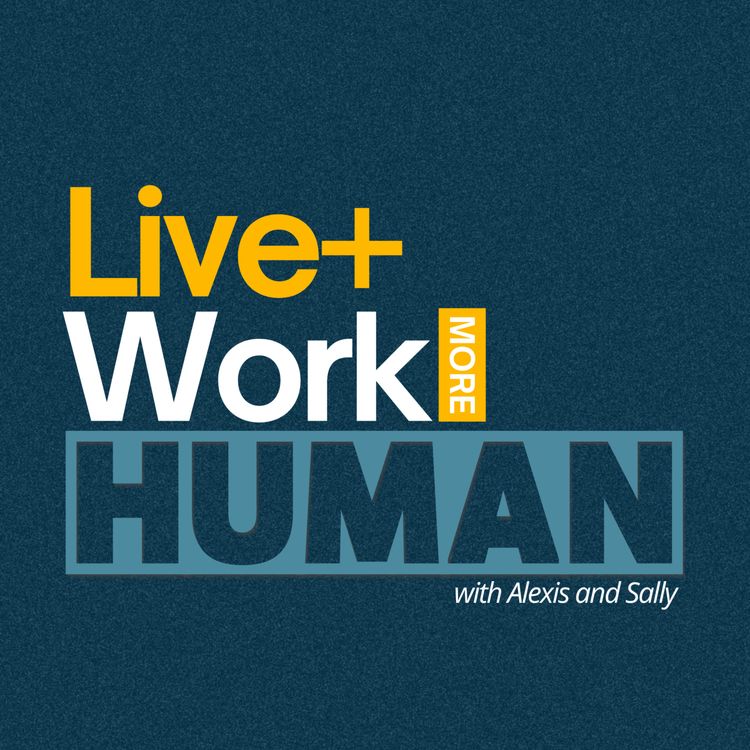
Live+Work More Human
Leading With Vulnerability: Using Vulnerability Effectively for Leaders with Jacob Morgan
There’s no denying that vulnerability has been a buzzword in leadership for some time now. But what exactly does vulnerability look like in the workplace, and how do we use it effectively in leadership?
In today’s conversation we explore the concept of with vulnerability with Jacob Morgan author of Leading with Vulnerability. He details how leaders can effectively use vulnerability to connect, motivate and engage teams.
Jacob Morgan is a trained futurist and one of the world’s leading authorities on leadership, the future of work, and employee experience, He speaks in front of tens of thousands of people each year and his content is seen over a million times a year. Jacob is the best-selling author of five books: Leading With Vulnerability (Wiley 2024), The Future Leader (Wiley 2020) The Employee Experience Advantage (Wiley, 2017), The Future of Work (Wiley, 2014), and The Collaborative Organization (McGraw Hill, 2012). He speaks at over 50 conferences a year including TED Academy which is one of the largest TED events in the world. In addition Jacob provides advisory and thought leadership services to various organizations around the world.
To learn more about Jacob Morgan and find his latest book, check out our show notes at www.wearehumanleaders.com/podcast
More episodes
View all episodes
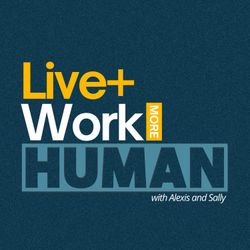
7. Overwork: Burning Ambition or Coping Mechanism?
39:16||Season 4, Ep. 7This incredibly timely conversation between your hosts Alexis and Sally delves into the complex relationship between loneliness and work identity, exploring how societal pressures and personal experiences shape our connection to work and each other. Sharing personal experience as well as data and expertise, Sally and Alexis discuss the impact of technology on social interactions, the challenges of forming adult friendships, and the responsibility of organizations to foster a sense of belonging. We share candid personal anecdotes and practical strategies for combating loneliness that will resonate for everyone, emphasizing the importance of community engagement and meaningful connections.Key insights include:How loneliness is increasingly recognized as a societal issue.Why work can become a primary source of identity, leading to over-investment in professional roles.The ways creating belonging in organizations is essential for employee well-being.How personal experiences of loneliness can inform our understanding of workplace dynamics.The role of technology in facilitating connections (but why it shouldn't replace in-person interactions!).How engaging in community activities can foster deeper connections.Real talk: adult friendships are hard.Why we feel organizations have a responsibility to address employee loneliness.The ways in which courageous acts of connection can have a ripple effect.Why for all of us, finding meaning beyond work is crucial for mental health.Chapters00:00 Exploring Loneliness and Work13:39 Personal Experiences of Loneliness24:58 The Role of Technology in Connection33:55 Organizational Responsibility in Combating LonelinessLearn more at www.liveandworkmorehuman.com Thank you for being an incredible part of the Live+Work More Human community.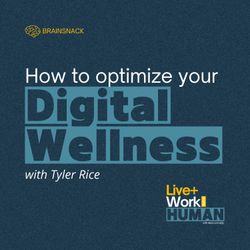
6. Brain Snack: How to Optimize Your Digital Wellness
12:04||Season 4, Ep. 6Welcome to the latest Brain Snack from Live+Work More Human. In this conversation, Sally Clarke and Alexis Zahner speak with Tyler Rice to explore the concept of digital wellness, emphasizing the importance of finding balance with technology in our lives and workplaces. They discuss the challenges posed by an always-on culture, the significance of tactical disconnection, and practical strategies for achieving a healthier relationship with technology.TakeawaysDigital wellness is essential for flourishing in the digital age.Tactical disconnection involves small, intentional breaks from technology.The shift to remote work has heightened the need for digital wellness.Productivity should not be solely measured by connectivity.Finding balance with technology is crucial for mental health.Optimal usage of technology varies for each individual.Intention plays a key role in determining optimal technology use.The evolution of technology has changed our work-life dynamics.Disconnection can be as important as connection.Creating a healthy relationship with technology requires conscious effort.Chapters00:00 Understanding Digital Wellness03:45 The Importance of Digital Wellness at Work06:46 Tipping Points in Technology and Work-Life Balance09:45 Defining Tactical Disconnection11:43 Introduction to Human-Centric WorkplacesLearn more at www.liveandworkmorehuman.com
5. Escape Survival Mode for a Thriving Life and Career
46:27||Season 4, Ep. 5In today's episode of Live+Work More Human (formerly We Are Human Leaders), Alexis and Sally sit down with CEO and author Jon Rosemberg to discuss what it means to shift from survive, to thrive. And the impact this has for our careers and lives.We explore the concept of survival mode as an evolutionary mechanism that many people find themselves in today. Jon generously shares his personal journey from survival to thriving, emphasizing the importance of agency, social connection, and intrinsic worth. And, our discussion explores the distinction between thriving and success, the significance of psychological flexibility, and the development of a map to guide individuals towards a thriving life. Jon encourages listeners to recognize their intrinsic value and practice agency in their daily lives, ultimately fostering a ripple effect of positive change in their communities.Key takeaways:That survival mode is a natural evolutionary response.How we can recognize when we are in survival mode.The reasons thriving is about agency, meaning, and social connection.Why success is often defined by external factors like money and status.The reasons agency is the ability to make intentional choices that matter.How psychological flexibility allows us to adapt and find new paths.Reasons our identities should be complex and not solely tied to our work.That intrinsic worth exists beyond our productivity and achievements.How mall moments of agency can lead to significant change over time.That the journey to thriving is personal and requires self-exploration.Chapters00:00 Understanding Survival Mode06:05 The Shift to Thriving12:45 Defining Thriving vs. Success18:24 The Importance of Agency23:34 Mapping the Journey to Thriving25:31 The Power of Beliefs29:49 Developing Agency Through AIR31:21 The Importance of Psychological Flexibility36:19 Identity and Intrinsic Worth42:56 Embracing Agency for Personal GrowthLearn more about Jon, his book and his incredible work at the Live+Work More Human Podcast page here.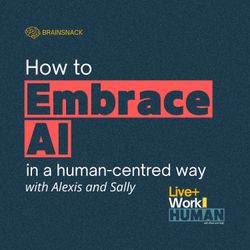
4. Brain Snack: How to Embrace AI in a Human-Centred Way
13:06||Season 4, Ep. 4Yes, it's another brilliant Brain Snack: bite-sized learning moments from Live+Work More Human.In today’s Brain Snack, we discuss the implications of AI on workplaces and teams, and how it can be used to drive positive human-centred outcomes. We share our thoughts on how AI can be used to address challenges like burnout, productivity and employee engagement.For more resources like this one, check out the Live+Work More Human podcast right here.For now, enjoy!
3. Compulsively Productive? How Busyness is Burning you Out!
44:08||Season 4, Ep. 3In this frank and animated conversation, co-hosts Alexis Zahner and Sally Clarke explore the complex relationship between productivity, rest, and burnout. They discuss personal experiences with productivity pressures, the societal expectations that contribute to burnout, and the importance of understanding different forms of rest.This open and insightful dialogue emphasizes the need for self-compassion, the role of therapy and coaching, and practical strategies for preventing burnout while fostering a healthier work-life experience for all of us.Key insights include:Why the struggle with productivity and rest is common among high achievers.How rest should not be viewed as a reward for productivity but as a necessity.The ways societal pressures often dictate our sense of worth based on productivity.Why burnout can occur in both organizational and personal contexts.The power of understanding different types of rest can help in recovery and prevention of burnout.Why therapy and coaching can provide valuable support in managing stress and burnout.The reasons we see self-assessment as crucial in recognizing burnout symptoms.How creating boundaries around work can enhance productivity and well-being.The key reasons finding joy and play in life is essential for mental health.Why, now more than ever, it's important to connect with others and share experiences to combat feelings of isolation. Chapters00:00 Introduction to Chaos and Productivity02:50 The Struggle with Productivity and Rest05:59 The Impact of Childhood on Productivity Mindset09:00 Understanding Different Types of Rest11:55 Navigating Faux Productivity14:55 The Connection Between Worth and Productivity17:59 Societal Pressures and Personal Value20:56 The Pervasiveness of Burnout and Its Consequences24:29 Understanding Burnout: Personal Experiences and Definitions30:09 The Role of Therapy and Coaching in Managing Burnout36:09 Practical Strategies for Preventing Burnout40:56 Finding Joy and Play in Life Despite ChallengesLearn more, including the links to the episode with Dr Saunda Dalton Smith, right here https://www.wearehumanleaders.com/podcast/f-productivity-busyness-burnout
2. We Have Exciting News!
09:06||Season 4, Ep. 2In this episode, Sally Clarke and Alexis Zahner discuss the rebranding of the podcast to 'Live+Work More Human' (formerly We Are Human Leaders), and the introduction of their new partner, Humanico. They emphasize the importance of human-centered outcomes in leadership and the need for connection in hybrid and remote teams. The conversation also highlights the exciting themes and topics planned for the upcoming season, focusing on personal development and the integration of skills in both personal and professional contexts.Key TakeawaysRebranding reflects a broader understanding of leadership.Humanico provides a platform for organizational intelligence.Self-leadership is crucial for personal and professional growth.Skills learned in work apply to personal relationships.The split between work and life is arbitrary.Community feedback shaped the rebranding decision.The podcast aims to invite everyone into the conversation.Future episodes will cover practical skills and strategies.The focus is on becoming the best version of ourselves.Learn more at http://liveandworkmorehuman.com/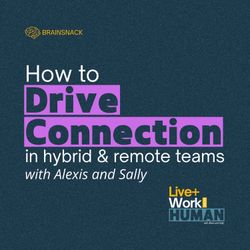
1. Brain Snack: How to Drive Connection in Hybrid and Remote Teams
08:15||Season 4, Ep. 1Welcome to Brain Snacks: bite sized learning moments from Live and Work More Human.In today’s Brain Snack, we share practical advice for driving more connection and belonging in hybrid and remote teams. And the do’s and don’ts for using online technology for connection, and how to best use time together wisely to drive deeper relationships.For more resources like this one, check out the Live and Work More Human podcast right here.For now, enjoy!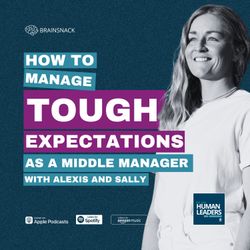
53. Brain Snack: How to Manage Tough Expectations as a Middle Manager
08:36||Season 3, Ep. 53Welcome to Brain Snacks: bite sized learning moments from We Are Human Leaders.In today’s brain snack, we share advice for managers struggling to manage team productivity and not burn themselves out. This includes practical tips to help you manage up successfully. This is part of a four part brainsnack series where we answer your questions.For more, check resources like this one, check out the We Are Human Leaders podcast right here www.wearehumanleaders.com/podcastFor now, enjoy!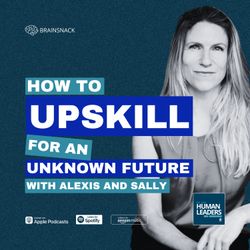
52. Brain Snack: How to Upskill for an Unknown Future
06:56||Season 3, Ep. 52Welcome to Brain Snacks: bite sized learning moments from We Are Human Leaders.In today’s brain snack, we discuss how to upskill for a future that’s uncertain and unpredictable. We share our expert insights on the mindsets and behaviours that will be critical for success now, and into the future. This is part of a four part Brain Snack series where we answer your questions.For more resources like this one, check out the We Are Human Leaders podcast right here www.wearehumanleaders.com/podcastFor now, enjoy!